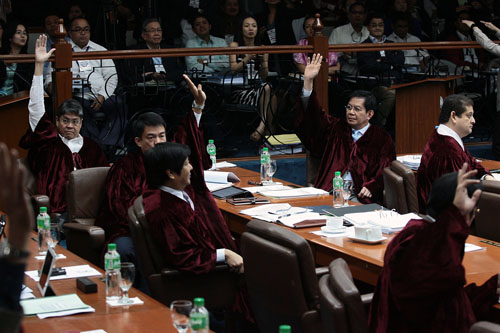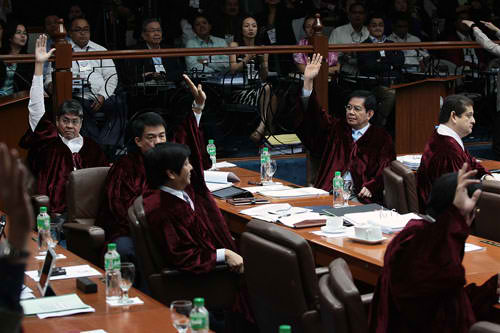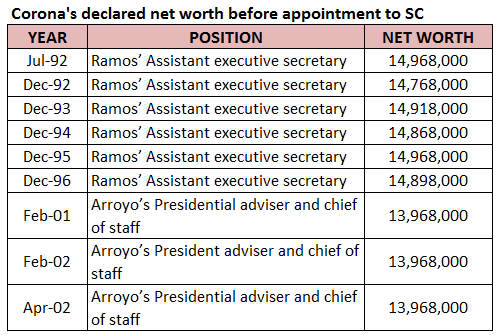
By BOOMA CRUZ
HOW much evidence does the prosecution have to present before the Senate impeachment court to convict Chief Justice Renato Corona?
The answer to this most important question is still up in the air although legal minds, including some senator-judges, agree that proof beyond reasonable doubt is definitely not a requirement.
Sen. Francis “Chiz” Escudero says senator-judges are not after proof beyond reasonable doubt because impeachment is not a criminal case.
“Administrative case lang naman talaga ang impeachment. Hindi naman ito layuning makulong si Chief Justice Corona, hindi nito layuning pagbayarin siya ng danyos perwisyo o civil damages (Impeachment is really an administrative case. The goal is not to imprison Chief Justice Corona or make him pay civil damages),” Escudero explained. “Ang layunin lamang nito ay dalawa: tanggalin siya sa pwesto at pangalawa ipagbawal na siya’y magtrabaho para sa anong sangay o ahensya ng pamahalaan habang buhay (The aim is two-fold: remove him from office and second, disqualify him perpetually from public office).”
Under the rules of court, substantial evidence is the requirement for conviction in an administrative case.
To former senator Aquilino Pimentel, one of the sitting senator-judges in the aborted trial of President Joseph Estrada, the evidence required in impeachment proceedings is “any kind of proof convincing enough to a reasonable mind should be sufficient.”
For Sen. Franklin Drilon, a senator-judge in both the Estrada and Corona impeachment trials, the matter is best left to one’s conscience.
The Senate impeachment court has not discussed the quantum of evidence needed to convict Corona. It was among the issues lawyers of the chief justice wanted to discuss and settle in a pretrial conference, but the Senate impeachment court rejected the motion on the first day of the impeachment trial.
Former University of the Philippines College of Law Dean Raul Pangalanan believes the ruling helped the impeachment court avoid a trap. Since there is no precedent and the question of evidence has never been settled, he says the Supreme Court could step in and define for the impeachment court the kind of evidence needed to convict Chief Justice Corona.
“Therefore, you basically set yourself up to be reviewed by the Supreme Court all over again,” said Pangalanan, pointing out the Supreme Court’s expanded jurisdiction under the Constitution.
Under the 1987 Constitution, the Supreme Court has the power and duty to determine grave abuse of discretion of any office, officer or agency of the government.
Because the ongoing trial is, by all indications, an administrative proceeding, the decision of Senate President Juan Ponce to reject the prosecution’s motion to subpoena Corona surprised UP law professor Harry Roque. He said the chief justice could be subpoenaed because the right against self-incrimination can be invoked only in criminal cases.
“Wala namang isyung kriminal dito. Ang isyu lamang ay pagpapatuloy ng kanyang panunungkulan (The issue is not criminal. The issue is whether he should continue as Chief Justice),” added Roque.
Enrile, the impeachment court’s presiding justice, denied the motion the grounds that the subpoena would violate Corona’s right against self-incrimination. His decision was upheld by a vote of 15-6.
Former Supreme Court Associate Justice Serafin Cuevas, Corona’s lead counsel, acknowledges that impeachment is not a criminal case.
Reacting to suggestions that he should resign as Corona’s lead counsel because he is receiving a monthly government pension, Cuevas pointed to Republic Act 910 which says retired justices cannot appear in cases where the accused is charged with a criminal offense.
“Is this (impeachment) a criminal case?” Cuevas has been quoted as saying.
Because the impeachment trial is an administrative proceeding, Drilon said the court cannot extend any protection to witnesses. The witness protection program is for legislative inquiries and not for adversarial proceedings like the impeachment trial, he added.
“Ito po’y paglilitis ng isang kaso at mayrong prosecution, mayrong depensa, may naglalaban. Yung witness protection law ay instrumento ng estado (This is a trial where there is a prosecution and there is defense, there are protagonists. The witness protection law is an instrument of the state). It is protection given by the state. And here, the state cannot take sides as a state,” said Drilon.
Protection for witnesses is a major concern for the prosecution. According to Iloilo Rep. Niel Tupas, the prosecution’s lead counsel, a number of potential witnesses from the judiciary have agreed to take the witness stand provided their physical as well as professional security is guaranteed.
Tupas said the prosecution cannot give witnesses any guarantees because the judiciary is a co-equal branch of Congress.
“Wala talagang eksaktong assurance except na labanan na lang natin ito kasi ito ay para sa bayan. And kung magtagumpay tayo dito, ibig sabihin pag na convict ito, malaking reform ang mangyayari, even dun sa kanilang branch of government (There is no exact assurance except to fight for this because this is for the country. If we succeed, which means there is conviction, big reforms will take place even in their branch of government),” he added.

